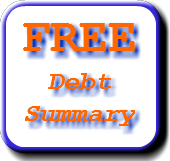Yesterday I discussed the first step of how to Get Out of Debt FAST: Get to Know Your Debt. Now you are ready for part 2:
 Create a Plan to Pay Off Your Debt
Create a Plan to Pay Off Your Debt
Having written down all your debts, it’s now time to determine how you will go about paying off these bills. A solid plan should not be complicated. It’s simply your approach to tackling your debt. There are, however, some important considerations and tools that can help you develop an effective debt repayment plan:
- Debt Repayment Calculator: As a starting point, it’s helpful (and sometimes painful) to see how long it will take you to pay off your debt if you make just the minimum payments. And there is a free debt repayment calculator that is very easy to use. While the plan will involve making extra payments, the starting point is to understand what you are up against making just the minimum payments on your debt, and this calculator will help you do just that.
- Prepare a Budget: For many, the word “budget” is the dreaded “B” word. But the fact is that you need a budget to control your spending and better manage your money. Remember that it’s the money you don’t spend each month that will go toward paying down your debt.
3. Be Aggressive About Paying Off Debt: Dave Ramsey talks about tackling debt with “gazelle” intensity. It’s about being aggressive in paying off your debt. As you work through your budget, recognize that every dollar counts, and that the more you throw at your debt, the less interest you’ll pay and the faster you’ll get out of debt.
4. Be Realistic About Paying Off Debt: Paying off debt is a lot like going on a diet. You can commit to never eating foods that are bad for you, but is that realistic? The same is true with debt. Yes, sacrifices will have to be made to meet your financial goals, but you need balance.
5. Order Your Debt: With your budget in place and an understanding of how much extra money you can put towards debt, it’s now time to map out a specific plan. The question is this–which debt will you put your extra money toward first? That said, here are the top three approaches to deciding how to tackle your debt:
- Highest Interest Rate First: With this approach, you put all the extra cash you have on the debt that has the highest interest rate. This approach will result in the lowest interest charges and the fastest debt repayment possible.
- Smallest Balance First: This is the Debt Snowball approach. He suggests targeting the debt with the smallest balance first. While that debt may not have the highest interest rate, the theory is to get one debt paid off as fast as possible. The rationale is twofold. First, paying off a debt gives you a feeling of accomplishment, which may be just the motivation you need to keep on track. Second, by paying of a debt completely, you free up the cash that was needed to make monthly payments to that bill. While you are likely to put that cash to the next debt, in an emergency, you could use it for other purposes. In other words, by paying the smallest debt first, you free up cashflow.
- Non-Revolving Debt First: While many talk about the two approaches above, few look at the type of debt when deciding which one to pay first. Recall that revolving debt, like credit cards, allows you to borrow again after you’ve paid down the debt. Non-revolving debt, like a car or school loan, does not permit you to borrow again as you pay down the debt. With a car loan, once the debt is paid, the loan is gone. With a credit card, once the debt is paid, the card is still there to use again if you so chose. For this reason, I’ll often focus on non-revolving debt first. Why? Because I can’t go out and charge up the debt again once it’s paid. This is purely a pyschological issue, but an important one, particularly if you fear you may lack some discipline once some of your debt is paid off.
6. Don’t Forget Your Emergency Fund: An emergency fund is a really important part of a debt elimination program. While you may be tempted to put 100% of your extra cash toward debt, keeping at least some of it aside for emergencies will help break the reliance many have on credit.







